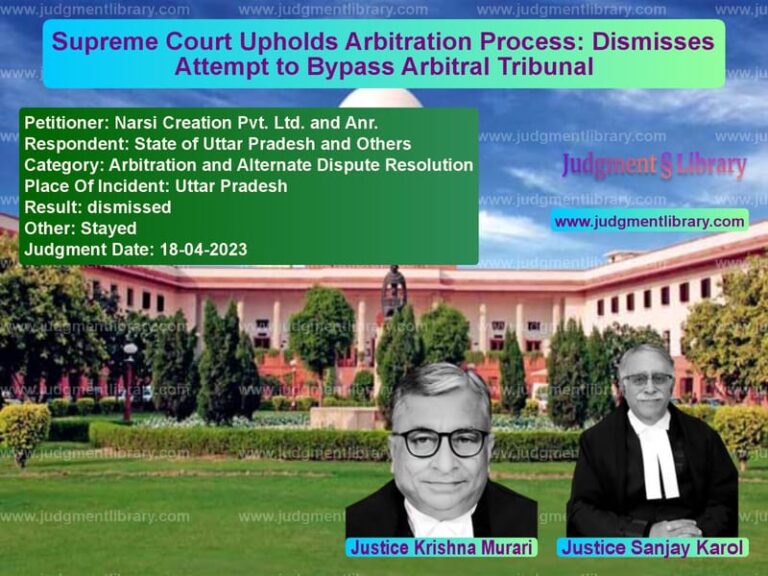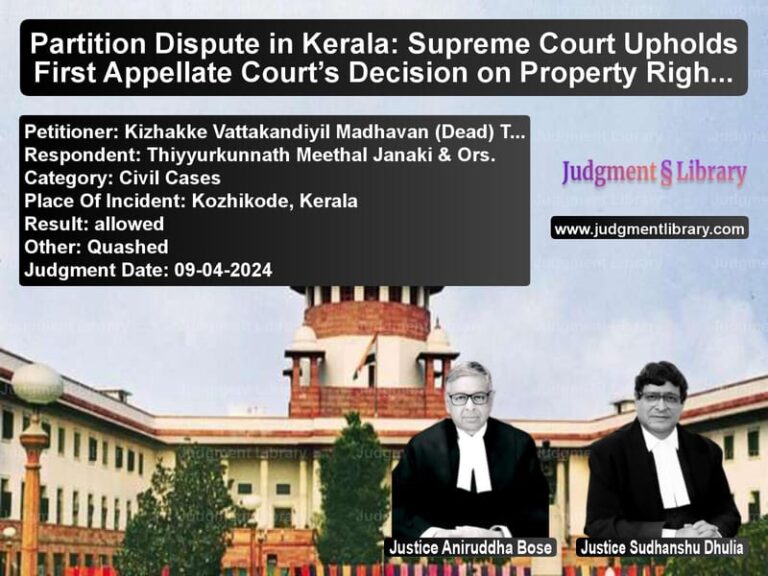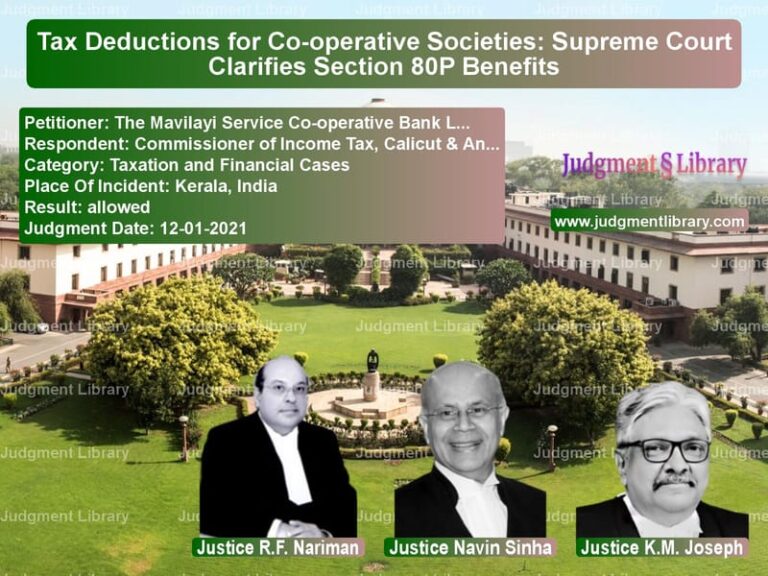Supreme Court Ruling on Proclaimed Offender Status and Section 174A IPC
The Supreme Court, in the case of Daljit Singh v. State of Haryana & Anr., addressed significant legal questions regarding the status of proclaimed offenders and the applicability of Section 174A of the Indian Penal Code (IPC). This case revolved around the interpretation of Section 82 of the Criminal Procedure Code (Cr.P.C.) and whether an accused person can continue to be prosecuted under Section 174A IPC even if their proclaimed offender status is nullified.
The appeal was filed against the judgment of the Punjab & Haryana High Court, which had refused to quash the proceedings against the appellant, Daljit Singh. The Supreme Court examined whether the proclaimed offender status under Section 82 Cr.P.C. can persist if the accused is later acquitted in the same case.
Case Background
Daljit Singh, the appellant, was involved in a business contract for the ‘8-Laning’ of National Highway 1 (NH-1) in Delhi. A dispute arose between the appellant and another company, M/s Bhola Singh Jaiprakash Construction Ltd., over the quality of construction materials supplied. The contract was terminated by the National Highways Authority of India (NHAI), and financial transactions between the parties led to a legal dispute.
Key developments in the case:
- A complaint was filed against Daljit Singh regarding an unclaimed security cheque.
- Summons were issued against him on 17th August 2010.
- He was declared a proclaimed offender on 28th November 2016 by the Judicial Magistrate, 1st Class, Bhiwani.
- He was arrested under the Proclaimed Offender (PO) order on 19th December 2022 and later released on bail.
- After his acquittal under Section 138 of the Negotiable Instruments Act, he sought quashing of the proceedings under Section 482 Cr.P.C., which was denied by the High Court.
Petitioner’s Arguments
Daljit Singh’s counsel argued that since he had been acquitted in the primary case, his status as a proclaimed offender under Section 82 Cr.P.C. should not continue. The main contentions included:
- The proclaimed offender status should be revoked if the accused is acquitted in the main case.
- Section 174A IPC should not apply if the original basis for declaring someone a proclaimed offender ceases to exist.
- The proceedings against him should be quashed as he had already settled the financial dispute.
Respondent’s Arguments
The State of Haryana opposed the plea, stating that:
- Daljit Singh had been declared a proclaimed offender and failed to appear before the court when required.
- Section 174A IPC is a separate substantive offense, and the prosecution can continue even if the original case is resolved.
- The High Court correctly held that a person declared a proclaimed offender cannot maintain a quashing petition.
Supreme Court’s Observations
The Supreme Court examined key precedents and the legislative intent behind Section 82 Cr.P.C. and Section 174A IPC. The Court referred to:
- Kartarey v. State of U.P.: Defined an absconder as someone hiding to evade the law.
- Vimlaben Ajitbhai Patel v. Vatslaben Ashokbhai Patel: Stated that attachment under Section 82 Cr.P.C. should be withdrawn once the purpose is achieved.
- Raghubir Singh v. State of U.P.: Held that absconding is only a weak link in proving guilt.
The Court held that:
- Section 174A IPC is a stand-alone offense, meaning that prosecution can continue even if the proclamation under Section 82 Cr.P.C. is nullified.
- While proceedings under Section 174A IPC can only start after a proclamation is issued, they do not automatically end if the proclamation is later withdrawn.
- If an accused is acquitted in the main case, the trial court can consider that as a factor to close the proceedings under Section 174A IPC.
Final Judgment
The Supreme Court allowed the appeal, ruling that:
- Since Daljit Singh had been acquitted in the main case, there was no justification for continuing proceedings under Section 174A IPC.
- The proclaimed offender status against him was quashed.
- All criminal proceedings, including the FIR under Section 174A IPC, were closed.
Implications of the Judgment
This ruling clarifies that while Section 174A IPC is an independent offense, courts have discretion to terminate proceedings if the original case is resolved. It ensures that accused individuals are not unfairly prosecuted under procedural technicalities if they have already been acquitted in the main case.
Petitioner Name: Daljit Singh.Respondent Name: State of Haryana & Anr..Judgment By: Justice Sanjay Karol, Justice C.T. Ravikumar.Place Of Incident: Bhiwani, Haryana.Judgment Date: 02-01-2025.
Don’t miss out on the full details! Download the complete judgment in PDF format below and gain valuable insights instantly!
Download Judgment: daljit-singh-vs-state-of-haryana-&-a-supreme-court-of-india-judgment-dated-02-01-2025.pdf
Directly Download Judgment: Directly download this Judgment
See all petitions in Bail and Anticipatory Bail
See all petitions in Fraud and Forgery
See all petitions in Extortion and Blackmail
See all petitions in Judgment by Sanjay Karol
See all petitions in Judgment by C.T. Ravikumar
See all petitions in allowed
See all petitions in Quashed
See all petitions in supreme court of India judgments January 2025
See all petitions in 2025 judgments
See all posts in Criminal Cases Category
See all allowed petitions in Criminal Cases Category
See all Dismissed petitions in Criminal Cases Category
See all partially allowed petitions in Criminal Cases Category







